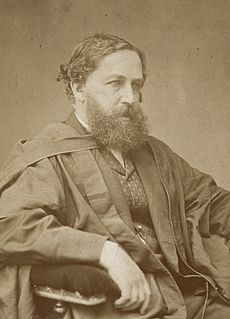
Marie-Esprit-Léon Walras was a French mathematical economist and Georgist. He formulated the marginal theory of value and pioneered the development of general equilibrium theory.

William Stanley Jevons FRS was an English economist and logician.
This article presents lists of the literary events and publications in 1686.
The Lewis–Mogridge position, named after David Lewis and Martin J. H. Mogridge, was formulated in 1990 and observes that as more roads are built, more traffic consequently fills these roads. Speed gains from some new roads can disappear within months, if not weeks. Sometimes, new roads help to reduce traffic jams, but in most cases, the congestion is only shifted to another junction.
The subjective theory of value is a theory of value which advances the idea that the value of a good is not determined by any inherent property of the good, nor by the amount of labor necessary to produce the good, but instead value is determined by the importance an acting individual places on a good for the achievement of his desired ends. The modern version of this theory was created independently and nearly simultaneously by William Stanley Jevons, Léon Walras, and Carl Menger in the late 19th century.
The paradox of thrift is a paradox of economics. The paradox states that an increase in autonomous saving leads to a decrease in aggregate demand and thus a decrease in gross output which will in turn lower total saving. The paradox is, narrowly speaking, that total saving may fall because of individuals' attempts to increase their saving, and, broadly speaking, that increase in saving may be harmful to an economy. Both the narrow and broad claims are paradoxical within the assumption underlying the fallacy of composition, namely that what is true of the parts must be true of the whole. The narrow claim transparently contradicts this assumption, and the broad one does so by implication, because while individual thrift is generally averred to be good for the economy, the paradox of thrift holds that collective thrift may be bad for the economy.

The Coal Question; An Inquiry Concerning the Progress of the Nation, and the Probable Exhaustion of Our Coal Mines is a book that economist William Stanley Jevons wrote in 1865 to explore the implications of Britain's reliance on coal. Given that coal was a finite, non-renewable energy resource, Jevons raised the question of sustainability. "Are we wise," he asked rhetorically, "in allowing the commerce of this country to rise beyond the point at which we can long maintain it?" His central thesis was that the supremacy of the United Kingdom of Great Britain and Ireland over global affairs was transitory, given the finite nature of its primary energy resource. In propounding this thesis, Jevons covered a range of issues central to sustainability, including limits to growth, overpopulation, overshoot, energy return on energy input (EROEI), taxation of energy resources, renewable energy alternatives, and resource peaking—a subject widely discussed today under the rubric of peak oil.
The Downs–Thomson paradox, also known as the Pigou–Knight–Downs paradox, states that the equilibrium speed of car traffic on a road network is determined by the average door-to-door speed of equivalent journeys taken by public transport.
In the social sciences, the observer's paradox refers to a situation in which the phenomenon being observed is unwittingly influenced by the presence of the observer/investigator.
In conservation and energy economics, the rebound effect is the reduction in expected gains from new technologies that increase the efficiency of resource use, because of behavioral or other systemic responses. These responses usually tend to offset the beneficial effects of the new technology or other measures taken.
Kirby is a surname. Notable people with the surname include:
In the 1980s, the economists Daniel Khazzoom and Leonard Brookes independently put forward ideas about energy consumption and behavior that argue that increased energy efficiency paradoxically tends to lead to increased energy consumption. In 1992, the US economist Harry Saunders dubbed this hypothesis the Khazzoom–Brookes postulate, and showed that it was true under neo-classical growth theory over a wide range of assumptions.
In economics, utility is the satisfaction or benefit derived by consuming a product; thus the marginal utility of a good or service is the change in the utility from an increase in the consumption of that good or service.
Light is a surname of English language.
Mary Anne Jevons, néeRoscoe (1795–1845) was an English poet.
Resource consumption is about the consumption of non-renewable, or less often, renewable resources. Specifically, it may refer to:
This page is based on this
Wikipedia article Text is available under the
CC BY-SA 4.0 license; additional terms may apply.
Images, videos and audio are available under their respective licenses.




